| Information
Service of
the Serbian Orthodox Church
April 8,
2005

SERBIAN
ORTHODOX CHURCH DELEGATION
IS NOT NEGOTIATING THE STATUS OF KOSOVO
BUT STRUGGLING FOR THE RIGHTS OF ITS FAITHFUL
Recently
the Serbian public has been informed by BK Television that during
talks conducted by the Serbian Orthodox Church delegation with
representatives of the U.S. State Department in Washington, D.C.
His Grace Bishop Grigorije of Zahumlje and Herzegovina proposed
that the status of Kosovo and Metohija "be negotiated directly
with the Serbian Orthodox Church, excluding the Serbian Government".
This
information is untrue and absurd. It is untrue because the clear
position of Bishop Grigorije and the entire Serbian Orthodox Church
delegation has been and remains that the sole purpose of direct
communication between our Church and the United Nations and the
U.S. Administration is to secure the protection of elementary
human rights for the Serbian people in Kosovo and Metohija, to
enable the return of displaced persons and the establishment of
a sustainable life for them, and to ensure the ownership of church
property and the restoration of destroyed holy sites of the Serbian
Orthodox Church. In short, the delegation is requesting the institution
of the standards of democracy and civilization for all persons
in Kosovo and Metohija; there are no talks regarding the future
status of the Serbian province.
This
information is absurd because neither the Serbian Orthodox Church
nor its delegation has the authority to negotiate on issues related
to the status of Kosovo and Metohija in the sense of a constitutional
and political solution; however, it does have the legitimacy to
talk about all issues of import for the Serbian people and Church
in Kosovo and Metohija, and especially the legal status of the
Serbian Orthodox Church, its usurped property and the restoration
of its destroyed holy shrines in Kosovo and Metohija. Hence, the
dissemination of untrue and absurd information in addition to
its ill intention, serves the purpose of denying the Serbian Orthodox
Church its legitimate right to act upon its concern for its faithful
and its property.

BELLS
TOLL IN SYMPATHY
With
the blessing of His Grace Bishop Irinej of Backa on the day of
the funeral of Pope John Paul II at 10:00 a.m. the bells tolled
in all churches of the Diocese of Backa in sympathy and the expression
of brotherly love towards the faithful of the Roman Catholic Church,
most of whom live on the territory of this diocese.
From
the Office of the Diocese of Backa

SERBIAN
ORTHODOX CHURCH DELEGATION MEETS WITH CONGRESSMAN TOM TANCREDO
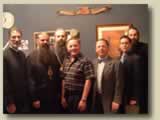 The
official Serbian Orthodox Church delegation to the United States
met on Friday, April 8, with US congressman Tom Tancredo from
the state of Colorado in the offices of Congress on Capitol Hill
in Washington. The
official Serbian Orthodox Church delegation to the United States
met on Friday, April 8, with US congressman Tom Tancredo from
the state of Colorado in the offices of Congress on Capitol Hill
in Washington.
The
delegation informed Mr. Tancredo regarding its activities and
meeting in the US to date, as well as scheduled meetings to be
held during the last week of its visit.
Congressman
Tancredo also learned of the difficult human rights situation
in Kosovo and Metohija, and the need for the US to become actively
involved in providing assistance for refugee returns, the rebuilding
of destroyed homes and churches, the restitution of Church property
nationalized after World War II, ensuring of basic human and religious
rights, as well as conditions for a dignified life, and adequate
protection for the Serbian cultural heritage in Kosovo and Metohija.
Congressman
Tancredo is one of the most active members of the Serbian caucus
in the US Congress. During the course of next week the SPC delegation
will also be holding a series of meetings with other members of
the caucus.

SERBIAN
ORTHODOX CHURCH DELEGATION
MEETS WITH NATIONAL SECURITY COUNCIL OFFICIAL
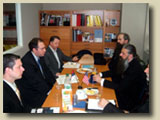 On
Wednesday, April 6, the official Serbian Orthodox Church delegation
met with Bertram Brown, the director for southeastern Europe in
the National Security Council. The meeting was held in the offices
of the Serbian Unity Congress in Washington. On
Wednesday, April 6, the official Serbian Orthodox Church delegation
met with Bertram Brown, the director for southeastern Europe in
the National Security Council. The meeting was held in the offices
of the Serbian Unity Congress in Washington.
At
the beginning of the conversation Mr. Brown emphasized that he
sincerely respects the position of the Serbian Orthodox Church,
which acted "bravely" in public even prior to the war
in Kosovo in expressing support for the opposition and the process
of democratization. He emphasized that Washington hopes that the
Church will continue to play the role of a partner for peace and
stability, and that it would "encourage the Serbs in Kosovo
and Metohija to become engaged in processes that are beneficial
to all citizens". Mr. Brown also emphasized that the U.S.
administration respects the achievement of the recently signed
Memorandum on the restoration of destroyed churches.
Bishop
Grigorije explained to his collocutor that the official Serbian
Orthodox Church headed out on this mission because "the situation
no longer allowed any hesitation". "As I have said many
times already, we did not come here to concern ourselves with
political issues but to assist in enabling the survival of our
faithful in Kosovo and Metohija, and our holy shrines, among which
the Pec Patriarchate, Decani and Gracanica are especially important,"
said the Bishop. He expressed the concern of the Serbian Orthodox
Church that "Kosovo and Metohija may become completely ethnically
cleansed unless the international community does not invest more
effort toward establishing the rule of law and order".
"There is also a danger that an entire European Christian
civilization will disappear, as well as that hasty solutions will
result in a new crisis spot which will create conflicts and instability
throughout the region," explained Bishop Grigorije. He added
that the Church "is aware that confrontation with the international
community would lead to the complete disappearance of our people
and our holy shrines".
Commenting on the views of the Serbian Orthodox Church on key
social issues, Bishop Grigorije emphasized that courage was necessary
but also support for all those who think constructively and realistically.
Mr. Brown stated that he believes that a critical period is approaching
for resolving the problems in Kosovo and Metohija. "The thing
isn't to punish anyone or take away something from anyone but
to create conditions so that Kosovo can function normally as a
multiethnic society," he explained. He added that the key
question in this process is decentralization. "However, in
order to be able to resolve this problem," continued Mr.
Brown, "as well as the issue of restitution of property,
restoration of churches and homes, it is necessary that we have
a collocutor and partner among the Kosovo Serbs". He also
emphasized the importance of the Memorandum for the restoration
of churches because "it is the first step and a way of encouraging
the Serbs to begin restoration regardless of whether Kosovo will
be independent, a part of Serbia or a protectorate". "As
an individual I understand the reasons for a boycott but if this
continues the position of the Serbs will be increasingly more
difficult. That is why the Church can help the people to get involved
and help themselves," concluded Mr. Brown.
Fr. Irinej Dobrijevic then joined in the discussion, emphasizing
the importance of restitution of property and refugee returns,
and mentioning the experience of the NGOs Philanthropy and the
IOCC. "Return does not mean 'colonization' but return to
one's own home, one's property and primarily to areas where Serbian
holy shrines already exist nearby," said Fr. Irinej.
Bishop Teodosije of Lipljan explained to Mr. Brown that the Church
enjoys a good reputation among the people and that the Serbian
Orthodox Church has firmly decided to adopt a more constructive
approach towards the international community. "With respect
to Serb participation in the institutions, it is very important
that the international community and Kosovo Albanians undertake
steps to show the Serbs that they will not merely serve as decorations
in the institutions, that they will be able to truly improve the
position of their people," said the Bishop. He explained
that the Serbs participated in local institutions for three years
and were rewarded in the end with the March 17, 2004 pogrom.
Mr. Brown responded that one of the concrete stimuli for the people
will be the restoration of destroyed churches and monasteries.
In his opinion the Church could play a key role in returns. He
cited the example of Bosnia and Herzegovina where "nothing
happened for four years and then suddenly everything became dynamic".
Bishop Teodosije emphasized that the Church is not in a position
to participate directly in the definition of political status,
but that it can and should represent the vital interests of its
faithful in order to secure rights and freedoms as well as adequate
protection for the cultural heritage of the Serbian people. In
this context the Church actively supports the process of decentralization
that would ensure protection at the local level for our people
as well as more effective possibilities for the preservation of
their identity, culture and self-government in key areas such
as, for example, health and education. "Serbs and other non-Albanians
must be protected not only as individuals but as peoples,"
emphasized the Bishop. He added that the highest standards for
protection of the Serbian cultural heritage in Kosovo and Metohija
also need to be implemented.
Continuing on the same topic, Dr. Sijakovic emphasized that the
same standards need to be implemented throughout the region. He
cited the example of the Presevo Valley and Kosovo, saying that
Kosovo officials are nowhere close to offering Serbs in Kosovo
and Metohija what Serbia is giving to the ethnic Albanians in
the Presevo Valley. "The resolution of property issues is
an especially big problem," said Dr. Sijakovic. He proposed
the forming of an independent agency for real estate to address
these problems.
Going back to the issue of the implementation of the Dayton agreement
in Bosnia and Herzegovina, Bishop Grigorije of Zahumlje and Herzegovina
emphasized that there is great concern among the people of Republika
Srpska that the agreement will be annulled, that the Serbs will
lose their independence, and that they will be suddenly marginalized
in Bosnia and Herzegovina. Explaining his view of the situation,
the Bishop emphasized that the percentage of Croats is rapidly
dropping and that Sarajevo is becoming a purely Muslim city, something
it has never been even during the Ottoman regime.
Mr. Brown told Bishop Grigorije that he sees no possibility for
a change of the Dayton agreement but that he insists on the carrying
out of responsibilities toward the Hague tribunal. He explained
that the international community wants to see a greater integration
of Bosnia and Herzegovina into the European Union in the near
future. "The international community is not against Republika
Srpska. It is against certain structures in Republika Srpska that
are seeped in corruption while the people are living in poverty,"
concluded Mr. Brown.

IOCC
WILL ACTIVELY PARTICIPATE IN THE RETURN PROCESS
IN KOSOVO AND METOHIJA
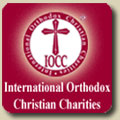 After
meeting with Bertram Brown, the Serbian Orthodox Church delegation
met in the offices of the Serbian Unity Congress with Dean Triantafilou,
a representative of International Orthodox Christian Charities. After
meeting with Bertram Brown, the Serbian Orthodox Church delegation
met in the offices of the Serbian Unity Congress with Dean Triantafilou,
a representative of International Orthodox Christian Charities.
During
the course of the meeting they discussed the possibilities for
engaging the IOCC in the return process, the restoration of their
homes and mini farm projects. It was emphasized that returns must
be sustainable and that people must be provided with economic
conditions for living. It was agreed to include the IOCC offices
in Belgrade and Podgorica in future coordination, as well as work
with the organization USAID.

SERBIAN
ORTHODOX CHURCH DELEGATION SIGNS
BOOK OF MOURNING IN WASHINGTON NUNCIATURE
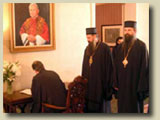 On
Wednesday, April 6, the official Serbian Orthodox Church delegation
which is presently on an extended visit to the United States of
America signed the book of mourning upon the death of Pope John
Paul II of Rome in the Apostolic Nuncio's office in Washington,
D.C. On
Wednesday, April 6, the official Serbian Orthodox Church delegation
which is presently on an extended visit to the United States of
America signed the book of mourning upon the death of Pope John
Paul II of Rome in the Apostolic Nuncio's office in Washington,
D.C.
The
delegation was greeted by Archbishop Gabriel Montalvo Higuera,
the Apostolic Nuncio to the USA, who thanked the SPC delegation
for its condolences expressed to the faithful of the Roman Catholic
Church. Monsignor Montalvo said that he had previously served
for six years as the Apostolic Pro-Nuncio in Belgrade, which remains
in his fond memories. Archbishop Montalvo conveyed his sincere
greetings to His Holiness Patriarch Pavle and the members of the
Holy Synod of Bishops of the Serbian Orthodox Church.

NEW
WEB SITE DEDICATED TO KOSOVO AND METOHIJA
At
the beginning of April 2005 the government of the Republic of
Serbia opened a new web site dedicated to Kosovo and Metohija
at http://www.srbija.sr.gov.yu/kosovo-metohija
The home page of the presentation provides the latest news about
Kosovo and Metohija. The site also provides all relevant documents
on the southern Serbian province, video reports from Kosovo and
Metohija, witness accounts of terrorism in Kosovo and Metohija,
and facts about the March 2004 pogrom (with photographs).

ANNUNCIATION
DAY IN CHICAGO
The
Serbian National Library from Chicago, the endowment of Milun
and Nada Nikolic, from this year will begin to organize an Annunciation
Day literary event in Chicago, which is expected to be held each
year in the Michigan city around the feast of the Annunciation.
Annunciation
Day in Chicago is the first Serbian literary event in the Western
hemisphere, just as the Library was in 1990 the first Serbian
library founded on the North American continent.
The
main program of the literary event will feature a modern Serbian
writer in light of the Serbian literary tradition. The lecturer
at the first event will be Dr. Bogdan Rakic, a professor at University
of Chicago, a world renowned Slavist and editor of Serbian Studies,
which is published in English in the United States. Professor
Rakic will speak about the poetry of Jovan Ducic and Djordje Nikolic,
a poet from Chicago.
The
Annunciation Day literary event will also feature the US promotion
of Nikolic’s books published in Serbia, including “Srpska glava”,
“Nebeski vrt”, “Dopis” and “U potrazi za Euridikom”. The event
will represent Nikolic’s first literary presentation in Serbian
in the US since his emigration to this country more than 33 years
ago.
In
addition to the cultural program, the event will include the launching
of a campaign to assist the Serbian Literary Association and Matica
Srpska. Toward this end the Library has set up a traveling literary
festival called “Giving Back to the Serbian Literary Association
and Matica Srpska”. Serbian writers will take part in literary
evenings to be organized both in Serbia and among the diaspora,
spreading the mission of the Serbian Literary Association and
Matica Srpska, and encouraging patriotic Serbs to help the work
and survival of these most important Serbian cultural centers.
The Annunciation Day literary event will also signal the beginning
of the “Giving Back” campaign, which will be organized and underwritten
throughout the world by the Serbian National Library from Chicago.
All proceeds from the sale of Nikolic’s books at the event will
be donated by the Library to the Serbian Literary Association
in order to meet this year’s publishing schedule.
“The
Serbian National Library plans to expand its campaign throughout
the US, Canada, Australia and Western Europe and to call on Serbs
to unite behind the ideal of preserving the Serbian language and
Serbian Cyrillic script by helping the Serbian Literary Association
and Matica Srpska. Without their historic role Serbdom would certainly
be deprived of its character reflected in the teachings of St.
Sava,” said Dragica Milosevic, the director of the Library.
This
year’s even will be held on St. Lazarus Sunday, April 23, 2005
in the great hall of the cathedral of the Resurrection of Christ
on Palmer Square in Chicago. The event will begin with a prayer
service and memorial to the poets Jovan Ducic, Ratko Petrovic,
Milos Crnjanski and other Serbian emigrant writers whose works
were created abroad but who remain an inalienable part of the
living body of Serbian literature.

KYR
STEFAN THE SERB CHOIR IN PRAGUE
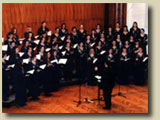 In
Prague on Monday, April 4, 2005 in the Orthodox church of Sts.
Cyril and Methodius, a concert of spiritual music was held. The
performer was the municipal woman’s choir Kyr Stefan the Serb
from Smederevo, a member of the Serbian Choir Association founded
in 2003. The concert was held in front of a full church where
in addition to large number of Serbs there were Czechs, Russians
and Ukrainians present. In addition to the Serbia and Montenegro
ambassador to Prague, Mr. Aleksandar Ilic, this spiritual event
was also attended by representatives of other diplomatic missions
in the Czech Republic, as well as 15 deputies of the Serbia and
Montenegro and the Republic of Serbia Assemblies from Belgrade
who are presently visiting their Czech colleagues. The first part
of the concert by one of our most eminent choirs, directed by
Milan Ilic, included songs from the Holy Liturgy, compositions
of Kyr Stefan the Serb, Mokranjac and Tajcevic. The second part
of the concert included authentic folk songs from Serbia. The
concert was organized by the founding board of the Serbian Orthodox
parish of Holy Prince Lazarus in Prague. In
Prague on Monday, April 4, 2005 in the Orthodox church of Sts.
Cyril and Methodius, a concert of spiritual music was held. The
performer was the municipal woman’s choir Kyr Stefan the Serb
from Smederevo, a member of the Serbian Choir Association founded
in 2003. The concert was held in front of a full church where
in addition to large number of Serbs there were Czechs, Russians
and Ukrainians present. In addition to the Serbia and Montenegro
ambassador to Prague, Mr. Aleksandar Ilic, this spiritual event
was also attended by representatives of other diplomatic missions
in the Czech Republic, as well as 15 deputies of the Serbia and
Montenegro and the Republic of Serbia Assemblies from Belgrade
who are presently visiting their Czech colleagues. The first part
of the concert by one of our most eminent choirs, directed by
Milan Ilic, included songs from the Holy Liturgy, compositions
of Kyr Stefan the Serb, Mokranjac and Tajcevic. The second part
of the concert included authentic folk songs from Serbia. The
concert was organized by the founding board of the Serbian Orthodox
parish of Holy Prince Lazarus in Prague.

[Serbian
Translation Services]

Copyright © 1999-2004 by
The Information Service of the Serbian Orthodox Church
11000 Belgrade
Kralja Petra I no.5
+381 11 3282 596
e-mail
|

